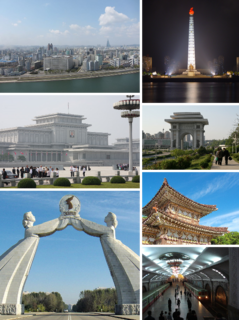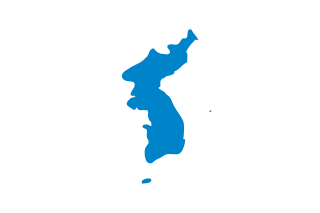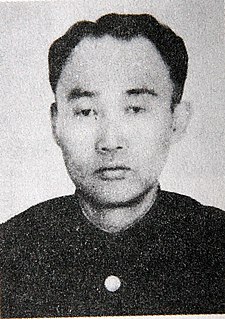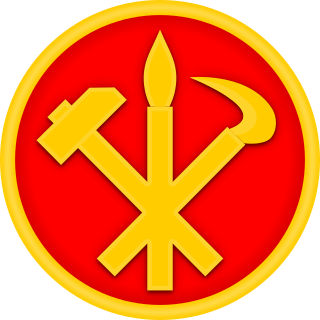| |||||
| Centuries: | |||||
|---|---|---|---|---|---|
| Decades: | |||||
| See also: | Other events of 2008 Years in North Korea Timeline of Korean history 2008 in South Korea | ||||
The following lists events that happened in 2008 in North Korea.
| |||||
| Centuries: | |||||
|---|---|---|---|---|---|
| Decades: | |||||
| See also: | Other events of 2008 Years in North Korea Timeline of Korean history 2008 in South Korea | ||||
The following lists events that happened in 2008 in North Korea.
The 2008 North Korea Census recorded the population of North Korea as 24,052,231 inhabitants (11,721,838 male and 12,330,393 female). [1]
The 2008 North Korea Census was a census conducted by the Central Bureau of Statistics over a period of 15 days from 1–15 October 2008.

North Korea, officially the Democratic People's Republic of Korea, is a country in East Asia constituting the northern part of the Korean Peninsula, with Pyongyang the capital and the largest city in the country. The name Korea is derived from Goguryeo which was one of the great powers in East Asia during its time, ruling most of the Korean Peninsula, Manchuria, parts of the Russian Far East and Inner Mongolia, under Gwanggaeto the Great. To the north and northwest, the country is bordered by China and by Russia along the Amnok and Tumen rivers; it is bordered to the south by South Korea, with the heavily fortified Korean Demilitarized Zone (DMZ) separating the two. Nevertheless, North Korea, like its southern counterpart, claims to be the legitimate government of the entire peninsula and adjacent islands.

The foreign relations of North Korea – officially the People's Republic of Korea (DPRK) – have been shaped by its conflict with capitalist countries like South Korea and its historical ties with world communism. Both the government of the DPRK and the government of South Korea claim to be the government of the whole of Korea. The Korean War in the 1950s failed to resolve the issue, leaving the DPRK locked in a military confrontation with South Korea and the United States Forces Korea across the Demilitarized Zone.

Pyongyang,P'yŏngyang or Pyeongyang, is the capital and largest city of North Korea. Pyongyang is located on the Taedong River about 109 kilometres (68 mi) upstream from its mouth on the Yellow Sea. According to the 2008 population census, it has a population of 3,255,288. The city was split from the South Pyongan province in 1946. It is administered as a directly-administered city with equal status to provinces, the same as special cities in South Korea, including Seoul.

Korean reunification refers to the potential unification of North Korea and South Korea, into a single Korean sovereign state. The process towards reunification was started by the June 15th North–South Joint Declaration in June 2000, and was reaffirmed by the Panmunjom Declaration for Peace, Prosperity and Unification of the Korean Peninsula in April 2018. In the Panmunjom Declaration, the two countries agreed to work towards a peaceful reunification of Korea in the future, and the joint statement of the United States President Donald Trump and North Korean Chairman Kim Jong-un at the Singapore Summit in June 2018.

Kim Jong-il was the second leader of North Korea. He ruled from the death of his father Kim Il-sung, the first leader of North Korea, in 1994 until his own death in 2011. He was an unelected dictator and was often accused of human rights violations.

Kimjongilia is a flower named after the late North Korean leader Kim Jong-il. It is a hybrid cultivar of tuberous begonia, registered as Begonia × tuberhybrida 'Kimjongilhwa'. When Kim Jong-il died in December 2011 the flower was used to adorn his corpse for public display. Despite its name, the Kimjongilia is not the official national flower of North Korea, which is the Magnolia sieboldii. Another flower, Kimilsungia, is an orchid cultivar named after Kim Jong-il's father and predecessor, Kim Il-sung.

Juche is the official state ideology of North Korea, described by the government as "Kim Il-sung's original, brilliant and revolutionary contribution to national and international thought". It postulates that "man is the master of his destiny", that the Korean masses are to act as the "masters of the revolution and construction" and that by becoming self-reliant and strong a nation can achieve true socialism.

Kim Jong-nam was the eldest son of North Korean leader Kim Jong-il. From roughly 1994 to 2001, he was considered the heir apparent to his father. He was thought to have fallen out of favour after embarrassing the regime in 2001 with a failed attempt to visit Tokyo Disneyland with a false passport, although Kim himself said his loss of favour had been due to advocating reform.

The Korean Central News Agency (KCNA) is the state news agency of North Korea. The agency portrays the views of the North Korean government for both domestic and foreign consumption. It was established on December 5, 1946.

Hamhŭng is North Korea's second largest city, and the capital of South Hamgyŏng Province. In late 2005, nearby Hŭngnam was made a ward (kuyŏk) within Hamhŭng-si. It has a population of 768,551 as of 2008.

Elections in North Korea are held every four-to-five years for the Supreme People's Assembly (SPA), the country's national legislature, and every four years for Local People's Assemblies.

Kim Nam-Il is a retired South Korean footballer who played as defensive midfielder. He was virtually unknown before he became a superstar for his impressive defensive displays for his national team during the 2002 FIFA World Cup.

Song Il-kook is a South Korean actor. He is best known for his role in the 2006 hit drama series Jumong as the titular character.

Chung-guyŏk is one of the 19 guyok which constitute the city of Pyongyang, North Korea. The district is located in the center of the city, between the Potong and Taedong Rivers, and is bordered to the north by Moranbong-guyok, to the northwest by Potonggang-guyok, and to the south by Pyongchon-guyok.

Kim Jong-un is a North Korean politician serving as Supreme Leader of North Korea since 2011 and also serving as the Chairman of the Workers' Party of Korea since 2012. Kim is the second child of Kim Jong-il (1941–2011) and Ko Yong-hui (1952–2004). He is the grandson of Kim Il-sung, who was the first leader of North Korea from 1948 to 1994. Kim is the first North Korean leader who was born after the country's founding.

Kim Chaek was a North Korean National resistance activist, general and politician. His real name was Kim Hong-gye(김홍계, 金洪啓).

The North Korean cult of personality surrounding its ruling family, the Kim family, has existed in North Korea for decades and can be found in many examples of North Korean culture. Although not acknowledged by the North Korean government, many defectors and Western visitors state there are often stiff penalties for those who criticize or do not show "proper" respect for the regime. The personality cult began soon after Kim Il-sung took power in 1948, and was greatly expanded after his death in 1994.

The 2007 Inter-Korean summit meeting was held between October 2 and October 4, 2007, in Pyongyang, between President Roh Moo-hyun of the Republic of Korea and Kim Jong-il of the Democratic People's Republic of Korea (DPRK). It is the second Inter-Korean summit following the 2000 inter-Korean summit. It is also called the 10.4 Inter-Korean summit. As a result of the talks, both sides announced a declaration for the development of inter-Korean relations and peace and prosperity.

The Propaganda and Agitation Department, officially the Publicity and Information Department, is a department of the Central Committee of the Workers' Party of Korea (WPK) tasked with coordinating the creation and dissemination of propaganda in North Korea. It is the highest propaganda organization in the country.